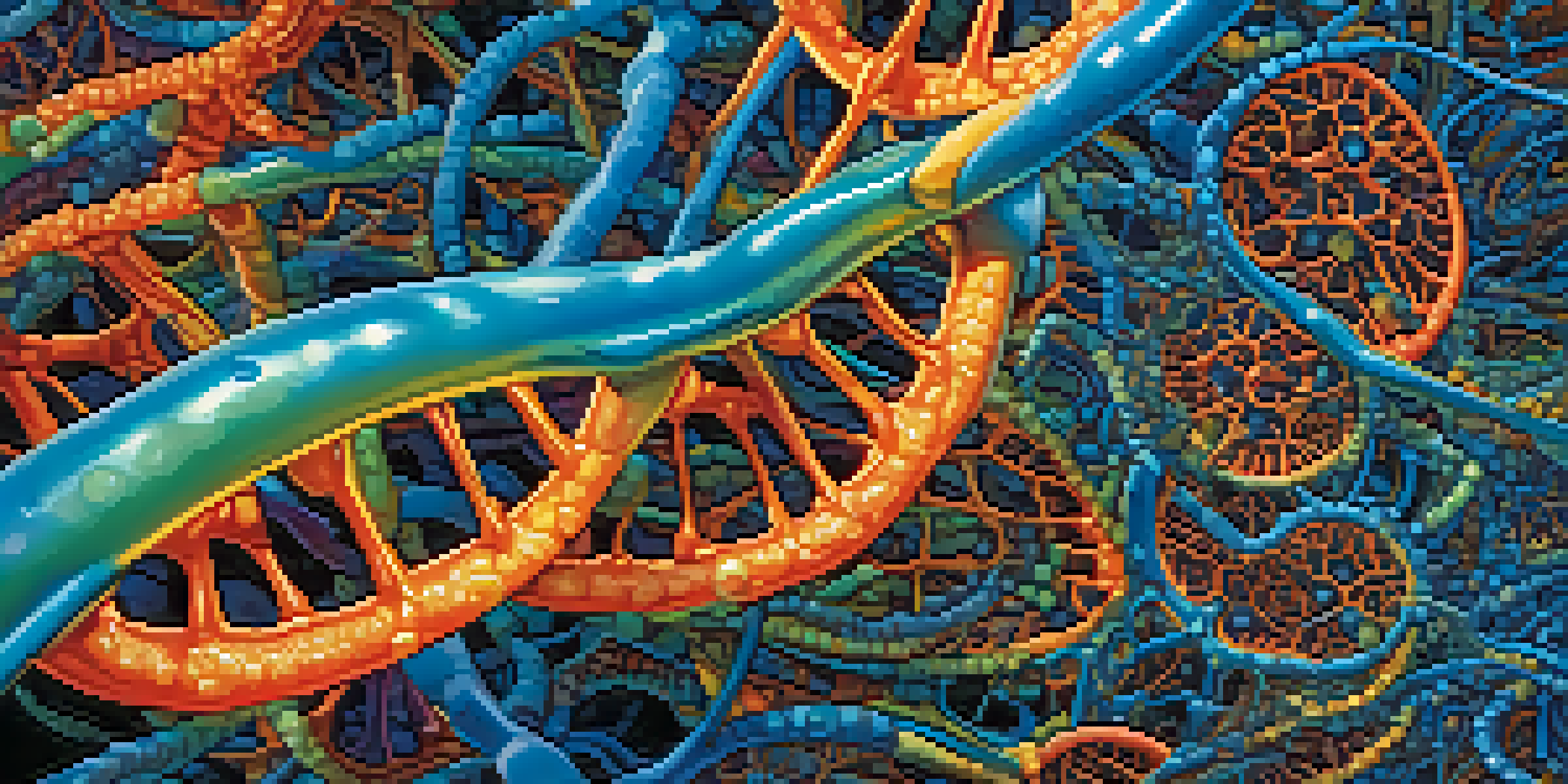The Role of Protein Synthesis in Muscle Growth Explained

What is Protein Synthesis and Why It Matters
Protein synthesis is the process where cells create proteins, essential for various bodily functions. In muscle growth, it plays a pivotal role, as proteins are the building blocks of muscle tissue. Without adequate protein synthesis, your body struggles to repair and grow muscle after exercise.
Protein is a building block of muscle, and without it, you can't build anything.
Think of protein synthesis like constructing a building. Each protein serves as a brick, and just as a solid foundation is needed for a building, your body needs sufficient protein to support muscle recovery and growth. This process is particularly crucial after resistance training when muscle fibers experience tiny tears that require repair.
Overall, understanding protein synthesis helps you appreciate its significance in enhancing workout results. By focusing on this process, you can optimize your training routine for better muscle development.
The Mechanics of Protein Synthesis Explained
At its core, protein synthesis involves two main processes: transcription and translation. During transcription, DNA is used as a template to create messenger RNA (mRNA). This mRNA then travels to ribosomes, the cellular machinery where translation occurs, and proteins are assembled based on the mRNA instructions.

Imagine this process as a recipe: the DNA is the cookbook, mRNA is the list of ingredients, and the ribosomes are the chefs preparing the dish. Each step must be executed precisely to ensure the final product – the protein – is created correctly. Disruptions at any stage can hinder muscle growth.
Protein Synthesis Supports Muscle Growth
Protein synthesis is crucial for repairing and building muscle tissue, especially after exercise.
Understanding these mechanics underscores the intricate balance and coordination required for effective protein synthesis. This knowledge is crucial for anyone looking to enhance their muscle-building efforts.
How Exercise Stimulates Protein Synthesis
Exercise, especially resistance training, acts as a catalyst for protein synthesis. When you lift weights or engage in strength exercises, your muscles endure stress, leading to micro-tears. This is where protein synthesis kicks in, repairing those tears and ultimately resulting in muscle growth.
You are what you eat, so don't be fast, cheap, easy, or fake.
Consider this like a workout for your body: just as muscles need to be challenged to grow stronger, protein synthesis needs the stimulus of exercise to become active. The more intense the workout, the greater the stimulation for protein synthesis, making it a vital component of any fitness regime.
Thus, coupling consistent exercise with proper nutrition can significantly enhance muscle development through effective protein synthesis.
The Role of Nutrition in Protein Synthesis
Nutrition plays a critical role in supporting protein synthesis. Consuming adequate protein sources, such as lean meats, legumes, and dairy, provides your body with the necessary amino acids for building muscles. Without these essential nutrients, your body cannot perform protein synthesis efficiently.
Think of nutrition as fuel for your workout engine. Just as a car runs better on quality fuel, your body performs better with a balanced diet rich in protein. This ensures that during recovery periods, your body has everything it needs to repair and build muscle effectively.
Nutrition Fuels Protein Synthesis
Adequate protein intake from sources like lean meats and legumes is essential for efficient protein synthesis.
In summary, a well-rounded nutritional plan is indispensable for maximizing the benefits of protein synthesis in muscle growth.
How Timing Affects Protein Synthesis
The timing of protein intake can significantly influence muscle protein synthesis. Consuming protein shortly after a workout, often referred to as the 'anabolic window', optimizes your body's ability to repair and grow muscle. This window typically lasts about 30 minutes to two hours post-exercise.
Imagine this timing as watering a plant right after you’ve planted a seed. If you water it at the right time, it has the best chance of growing strong and healthy. Similarly, consuming protein at the right time can enhance the muscle recovery process, making your workouts more effective.
Thus, being mindful of when you consume protein can maximize your muscle-building efforts.
Factors That Influence Protein Synthesis Rates
Several factors can influence the rate of protein synthesis, including age, hormonal levels, and overall dietary habits. For instance, as we age, our bodies may become less efficient at synthesizing protein, making it essential to adjust dietary strategies accordingly. Additionally, hormones like insulin and testosterone play significant roles in this process.
Think of these factors as variables in an equation. Just as changing one number can affect the outcome, altering your diet or understanding hormonal influences can modify your body's protein synthesis efficiency. Recognizing these variables enables you to tailor your approach to muscle growth.
Timing Enhances Muscle Recovery
Consuming protein shortly after a workout optimizes the body's ability to repair and grow muscle.
Ultimately, being aware of what affects protein synthesis can help you make informed decisions to boost your muscle-building potential.
Common Myths About Protein Synthesis and Muscle Growth
There are many myths surrounding protein synthesis and muscle growth that can mislead individuals on their fitness journeys. One common misconception is that consuming excessive protein will automatically lead to more muscle gain. In reality, the body can only utilize a certain amount of protein at a time, and excess is often wasted.
Imagine trying to pour a gallon of water into a cup. No matter how much you pour, the cup can only hold so much before it overflows. Similarly, your body has a limited capacity for protein synthesis, and moderation is key for optimal results.

By debunking these myths, you can adopt more effective and realistic strategies for enhancing muscle growth through protein synthesis.